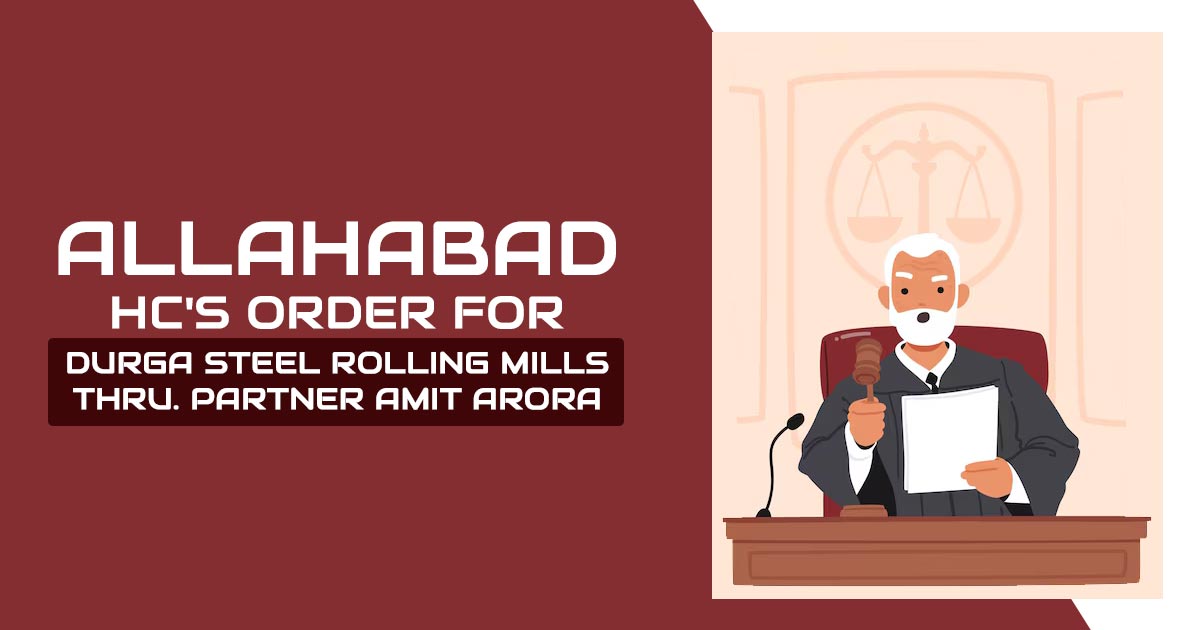
The Allahabad High Court ruled that the purpose of evading tax is an essential condition for levying penalty u/s 54(1)(2) of the Uttar Pradesh Value Added Tax Act, 2008.
Section 54(1) of the Uttar Pradesh Value Added Tax Act, 2008 furnishes for circumstances under which penalties can be charged to taxpayers. It is furnished that where an assessing authority is pleased that the taxpayer has done anything inaccurate cited therein, the penalty can be levied post giving due chance of hearing to such taxpayer.
Section 54(1)(2) furnishes for the charge of penalty in the matter that the dealer has concealed particular of his turnover or has slowly provided the wrong particulars of such turnover; or has submitted a wrong tax return under the Act or evades tax payment which he is accountable to pay under the Act. The penalty is 3 times the tax evaded in such a matter.
“Once the sine qua non to imposition of penalty is evasion of payment of tax and for evasion there has to be a willful act consequently the Court will have to examine as to whether there has been willful act on the part of the revisionist in evasion of tax,” Justice Abdul Moin said.
The Court ruled that penalty u/s 54(1)(2) shall not be levied in cases where the most acceptable judgment assessment has been incurred u/s 28(2) of the UPVAT Act since the most suitable judgment assessment is supposed to be incurred based on material available before the Assessing Authority.
Accurate Background
After the revisionist’s premises survey, an assessment order was passed u/s 28(2) of the UPVAT Act where the disputed demand was Rs. 12,44,653. The first Appellate Authority lessened the demand to Rs 6,22,778. Before the Tribunal Cross pleas were filed where a petition filed via the revisionist was partially permitted to decrease the tax obligation to Rs 2,46,250. The petition of the department was dismissed. The tribunal’s order reached to an end and the amount was deposited by the revisionist.
At the time of the pendency of the above-said proceedings, a notice u/s 54(1)(2) of the Act, 2008 was issued to the revisionist. Later, an order was passed directing the revisionist to pay Rs 18,65,625 against the assessed tax of Rs 6,21,875. Appeal and afterwards, second appeal furnished via the revisionist were dismissed.
Read Also: Allahabad HC: No Penalty U/S 129(3) When There is Clear Evidence of Intentional GST Evasion
The applicant’s counsel claimed that for the penalty levy u/s 54(1)(2) of the UPVAT Act, there has to be a precise finding for the intention to evade tax. It was contended that in the absence of any finding on mens rea to penalty could be charged on the revisionist.
High Court Decision
The court witnessed that under Section 28(2) of the UPVAT Act, the order of assessment might be passed if the assessing authority is been satisfied for the trueness of the books of accounts and the additional records cited in Section 28(1) of the Act examined by it. If the authority considers that these records are not credible, the authority might proceed to make the best judgment assessment of the turnover and the taxes to be levied.
The court noted that the assessing authority incurred the best judgment assessment of the turnover for the revisionist established on which the tax obligation had been finalized and on that tax obligation penalty was levied u/s 54(1)(2) of the UPVAT Act.
The court laid on distinct Supreme Court decisions in which the same is to be ruled that the best judgment assessment should be established on effective estimates instead of pure guess. These assessments must be on a “reasonable guess based upon the material available before the assessing authority.” As per that, the Court witnessed that the order passed u/s 28(2) of the Act by the Assessing Authority was based on material available to it.
The Court laid on the meaning of the Black Law Dictionary of tax evasion to maintain that tax evasion is an intent to defeat or circumvent the tax law to illegally lessen one’s tax obligation.
Highlighting the word “wilful”, the Court carried that the order of the Assessing Authority u/s 28(2) of the UPVAT Act was based on cogent material and does not signify an intentional defeat or avoid the tax law to diminish the tax liability. The Court, intention to evade tax is a must for penalty levy.
The court ruled that no finding for the willful attempt of the revisionist at evading tax was there. It was noticed that the revisionist has released its tax obligation as per the tribunal in the best judgment assessment proceedings. The court ruled that the same was on the heads to prove that revisionists had the objective to evade the tax.
“In absence thereto the order imposing penalty on the revisionist based on the assessment order passed under Section 28(2) of 2008 cannot be said to fall within the ambit of any of the eventualities as provided under Section 54(1)(2) of the Act 2008 more particularly it cannot be considered to be an evasion of payment of tax by the dealer/revisionist to attract the penalty as has been imposed on the revisionist.”
Consequently, the revision filed by the taxpayer was permitted.
| Case Title | Durga Steel Rolling Mills Thru. Partner Amit Arora v. Commissioner Of Commercial Taxes U.P. Lucknow [SALES/TRADE TAX REVISION No. – 40 of 2021] |
| Citation No | 2024:AHC-LKO:22796 |
| Date | 15.03.2024 |
| Counsel for Revisionist | Mudit Agarwal |
| Counsel for Opposite Party | C.S.C. |
| Allahabad High Court | Read Order |